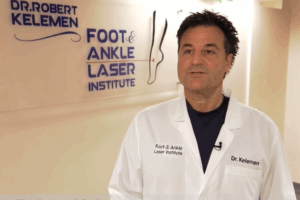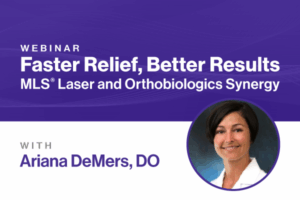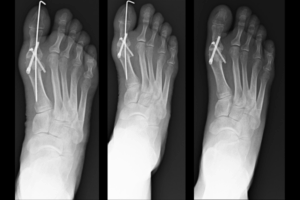This short animated video series is a great resource for patients inquiring about MLS Laser Therapy treatment protocols. They answer the top five questions you might get about MLS Laser Therapy and how to answer them.
What is MLS Laser Therapy and How Does it Work?
Laser Therapy is an FDA-cleared treatment for pain that uses concentrated light energy to stimulate the body’s own healing process. Laser therapy minimizes pain and inflammation as an alternative to prescriptions and surgery. It reduces recovery times, which is especially important post-surgery, so patients can quickly return to a higher quality of life.
The Multiwave Locked System (MLS) technology specifically delivers two therapeutic wavelengths: the 808nm (anti-edemic and anti-inflammatory) and the 905nm (analgesic). The combination of these wavelengths produces greater pain relieving effects than either can produce on their own, while also minimizing the risk of thermal damage. It is this unique combination and synchronization of continuous and pulsed emissions that characterizes MLS and distinguishes it from other Class IV lasers.
Will MLS Laser Therapy Work for Me?
For 85 to 90% of patients suffering from pain associated with arthritis, sprains or strains, sports injuries, inflammation, or other debilitating conditions, the answer is “Yes!”
Whether you have shoulder and neck pain, rotator cuff, carpal tunnel, aching knees, Achilles tendinitis, plantar fasciitis, sciatica, musculoskeletal pain or are recovering from surgery, they are likely to benefit from MLS Laser Therapy.
Ronald Lederman, MD of Ledrman Kwartowitz Center For Orthopedics & Sports Medicine has been offering laser therapy to patients for over 7 years and believes that the dual action, low energy light laser increases the mitochondrial activity of the cell, which creates a super-cell that promotes healing. He stated in a recent article published in Medco Forum, “Not only are we offering this laser to patients to eliminate painful conditions, but we’re also offering it to patients who have had surgeries, and we’re finding that they’re healing faster. We’re seeing a 50% reduction in recovery time.”
Are the effects of MLS Laser Therapy Long-Lasting?
While each person and each condition varies, almost 90% of patients receive tremendous relief from their pain and inflammation when they go through a series of MLS Laser Therapy treatments.
Most patients do not need additional treatments, but some conditions, like arthritis, are degenerative. The great thing about the laser therapy for arthritic patients is that once they feel better, they can be more active – helping minimize the long term effects of arthritis. Some patients prefer an occasional treatment every 4-6 weeks over the course of the year to hold the inflammation at bay and keep the arthritic pain in check.
Do Laser Therapy Treatments Hurt?
While lasers are commonly known for their heat components or surgical cutting purposes, our patented MLS technology ensures there is no thermal tissue damage due to our unique wavelength synchronization. There may be a slight warming sensation at the treatment site, which is normal and an indication that the inflammation is being relieved and that the body is responding properly.
Ronald Gardner, MD, of Gardner Orthopedics in Fort Meyers, FL noted that MLS Laser Therapy is a “non-medicinal, zero risk, effective, and painless way to treat patients. And when the pain goes away, it stays gone, so there’s nothing else to do.”
Is Laser Therapy Covered by Insurance?
While the MLS Therapy Laser is FDA-cleared, treatments aren’t covered by insurance. With rising appointment fees and out of pocket co-pays, the cost of the laser therapy treatments are actually less costly than other, more invasive treatments that are “covered” by insurance.
Patients of Marc Pietropaoli, MD, Founder and President of Victory Sports Medicine & Orthopedics in Skaneateles, NY have reacted very positively to MLS Laser Therapy as a self-pay treatment. About 75% of patients for whom the treatment is recommended accept it as part of their care plan. “They certainly like the idea of no surgery and no needles, but when discussing self-pay options such as PRP and stem cell therapy, which can easily run into the thousands of dollars, they tend to realize it is a very well-priced modality,” noted Dr. Pietropaoli.



